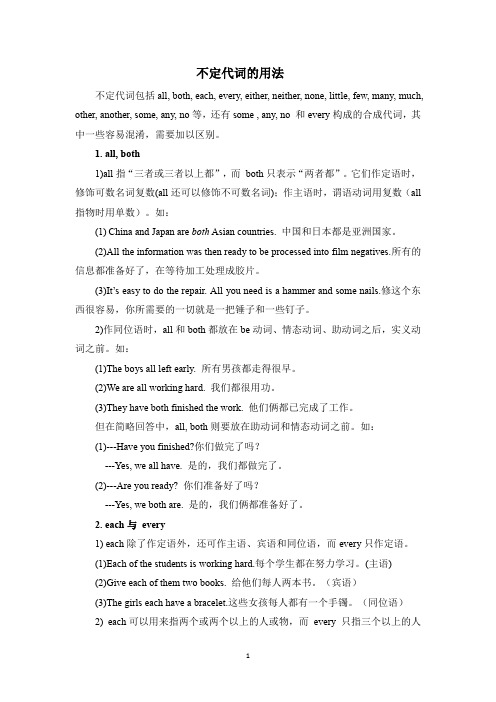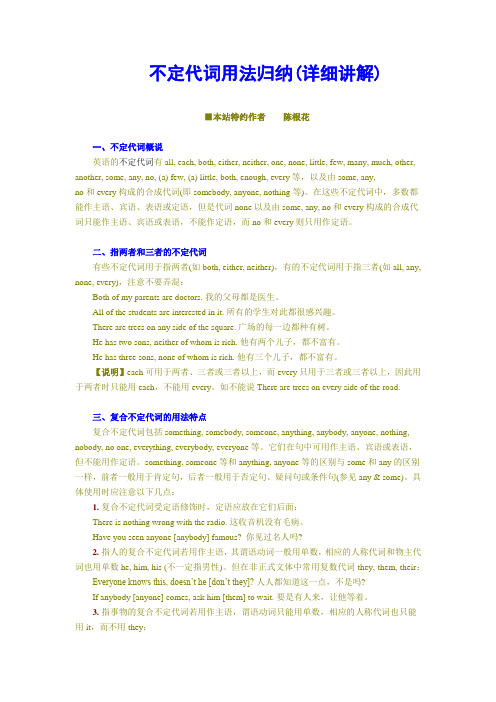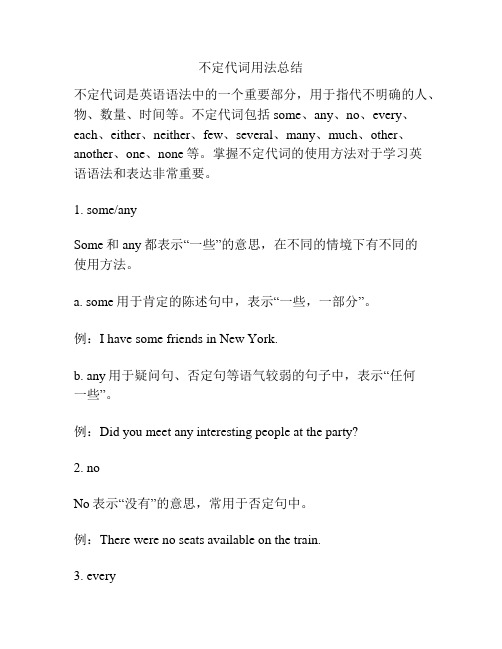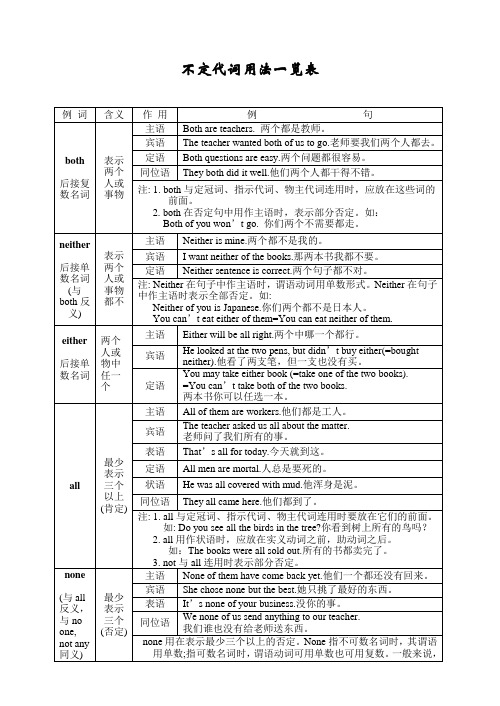(完整版)不定代词用法总结
不定代词的用法

不定代词的用法不定代词是指在句中代替不明确或不确定的名词的一类代词。
它们在句子中充当名词的成分,起到代替和指代的作用。
不定代词可以用来表示数量、身份、归属、程度、时间等概念。
在英语中,不定代词有多种形式和用法,本文将对其常见的用法进行探讨。
一、不定代词的形式和用法1. some和anya. some用于肯定句中,表示某种或某些。
b. any用于否定句和疑问句中,表示任何的、任何一种或任何一些。
例句:- Could you give me some water, please?(请给我些水好吗?)- I don't have any money.(我没有一分钱。
)2. all和botha. all用于肯定句中,表示全部或所有的。
b. both用于肯定句中,表示两者都。
例句:- All students must attend the assembly.(所有学生都必须参加集会。
)- Both of them are my friends.(他们两个都是我的朋友。
)3. each和everya. each表示每一个(两者或两者以上的人或事物)。
b. every表示每一个(三个或三个以上的人或事物)。
例句:- Each student should bring their own books.(每位学生应该带自己的书。
)- Every child loves ice cream.(每个孩子都喜欢冰淇淋。
)4. someone和anyonea. someone用于肯定句中,表示某人或有人。
b. anyone用于否定句和疑问句中,表示任何人或任何一人。
例句:- I saw someone waiting for you at the station.(我看到有人在车站等你。
)- Have you seen anyone around here?(你在这附近见过任何人吗?)5. something和anythinga. something用于肯定句中,表示某物或有物。
不定代词用法总结

不定代词用法总结-标准化文件发布号:(9556-EUATWK-MWUB-WUNN-INNUL-DDQTY-KII不定代词用法总结1) some, any, no的用法a. some和any通常用于表示不定数或不定量,修饰复数可数名词或不可数名词。
some表示“几个;一些;部分”,多用于肯定句;而any表示“一些;什么;任何;”,对用于否定句或疑问句中。
如:* He asked me some questions. (他问了我几个问题。
) * Some of the bread has been eaten. (面包已吃了一些。
) * Are there any stamps in this post office(这个邮局里有邮票吗?)* I didn’t have any cigarettes, so I went out to buy some. (我没有香烟了,所以出去买了一些。
)b. 刚才我们说some一般用于肯定句而any一般用于否定句和疑问句。
但有时也有例外。
这要根据句子意思来看。
* I could not answer some of his questions. (我不能回答他的某些问题。
)(some用在否定句中表示“一些;部分”。
如果说成:I could not answer any of his questions.意思就变了,它表示“我不能回答他的任何问题。
”)* Will you get me some apples on your way back (你回来的路上能给我带一些苹果吗?)(some用在疑问句中大多表示“请求” 或“建议”)* Let me know if you hear any news. (如果你有任何消息请告诉我。
) (any用在条件从句中表示“任何”)* “What would you like to drink”“Any will do.” (“你想喝什么?”“哪种都行。
不定代词的用法

不定代词的用法不定代词包括all, both, each, every, either, neither, none, little, few, many, much, other, another, some, any, no等,还有some , any, no 和every构成的合成代词,其中一些容易混淆,需要加以区别。
1. all, both1)all指“三者或三者以上都”,而both只表示“两者都”。
它们作定语时,修饰可数名词复数(all还可以修饰不可数名词);作主语时,谓语动词用复数(all 指物时用单数)。
如:(1)China and Japan are both Asian countries. 中国和日本都是亚洲国家。
(2)All the information was then ready to be processed into film negatives.所有的信息都准备好了,在等待加工处理成胶片。
(3)It’s easy to do the repair. All you need is a hammer and some nails.修这个东西很容易,你所需要的一切就是一把锤子和一些钉子。
2)作同位语时,all和both都放在be动词、情态动词、助动词之后,实义动词之前。
如:(1)The boys all left early. 所有男孩都走得很早。
(2)We are all working hard. 我们都很用功。
(3)They have both finished the work. 他们俩都已完成了工作。
但在简略回答中,all, both则要放在助动词和情态动词之前。
如:(1)---Have you finished?你们做完了吗?---Yes, we all have. 是的,我们都做完了。
(2)---Are you ready? 你们准备好了吗?---Yes, we both are. 是的,我们俩都准备好了。
(完整版)不定代词用法归纳

不定代词用法归纳(详细讲解)■本站特约作者陈根花一、不定代词概说英语的不定代词有 all, each, both, either, neither, one, none, little, few, many, much, other, another, some, any, no, (a) few, (a) little, both, enough, every 等,以及由 some, any,no 和 every 构成的合成代词(即somebody, anyone, nothing 等)。
在这些不定代词中,多数都能作主语、宾语、表语或定语,但是代词 none 以及由 some, any, no 和 every 构成的合成代词只能作主语、宾语或表语,不能作定语,而 no 和 every 则只用作定语。
二、指两者和三者的不定代词有些不定代词用于指两者(如both, either, neither),有的不定代词用于指三者(如all, any, none, every),注意不要弄混:Both of my parents are doctors. 我的父母都是医生。
All of the students are interested in it. 所有的学生对此都很感兴趣。
There are trees on any side of the square. 广场的每一边都种有树。
He has two sons, neither of whom is rich. 他有两个儿子,都不富有。
He has three sons, none of whom is rich. 他有三个儿子,都不富有。
【说明】each 可用于两者、三者或三者以上,而 every 只用于三者或三者以上,因此用于两者时只能用 each,不能用 every。
如不能说 There are trees on every side of the road.三、复合不定代词的用法特点复合不定代词包括 something, somebody, someone, anything, anybody, anyone, nothing, nobody, no one, everything, everybody, everyone 等。
(完整版)不定代词用法总结及配套练习题

不定代词用法总结1) some, any的用法some和any通常用于表示不定数或不定量,修饰复数可数名词或不可数名词。
some表示“几个;一些;部分”,多用于肯定句;而any表示“一些;什么;任何;”,对用于否定句或疑问句中。
如:* He asked me some questions. (他问了我几个问题。
)* Some of the bread has been eaten. (面包已吃了一些。
)* Are there any stamps in this post office? (这个邮局里有邮票吗?)1. "Would you like _____ more coffee?" (some/any) -------"Yes, please."2. I wonder if _____ will show up at the meeting. (someone/anyone)3. Doesn't _____ know the answer to this question? (someone/anyone)4. On TV _____ said that smoking does not cause lung cancer. (someone/anyone)5. (annoyed and emphatic) How can _____ tell such a pack of lies ? (someone/anyone)6. It must be difficult to live without _____ money. (some/any)7. Have you seen my shoes? I can't find them _____. (somewhere/anywhere)8. - "Can you believe we've run out of milk!"- "Would you like me to get _____ at the nearest shop?" (some/any)9. _____ say the Internet is just a hype and that it will blow over. (Some/Any)10. _____ day peace will come to Northern Ireland. (Some/Any)2) 复合不定代词的用法a. 不定代词some, any, no与-one, -body, -thing可以组成九个复合代词。
不定代词用法总结

不定代词用法总结不定代词是英语语法中的一个重要部分,用于指代不明确的人、物、数量、时间等。
不定代词包括some、any、no、every、each、either、neither、few、several、many、much、other、another、one、none等。
掌握不定代词的使用方法对于学习英语语法和表达非常重要。
1. some/anySome和any都表示“一些”的意思,在不同的情境下有不同的使用方法。
a. some用于肯定的陈述句中,表示“一些,一部分”。
例:I have some friends in New York.b. any用于疑问句、否定句等语气较弱的句子中,表示“任何一些”。
例:Did you meet any interesting people at the party?2. noNo表示“没有”的意思,常用于否定句中。
例:There were no seats available on the train.3. everyEvery表示“每一个”的意思。
例:Every student is required to attend the meeting.4. eachEach表示“每一个”,用于强调个体。
例:Each student is responsible for his or her own progress.5. either/neitherEither表示“两者中的任何一个”,neither表示“两者都不”。
例:You can choose either the blue or the red dress.例:Neither of us likes to cook.6. few/several/many/much这些代词都用于表示数量或程度。
a. few表示“很少,几乎没有”。
例:There were few people in the park on such a hot day.b. several表示“几个,若干”。
(完整版)不定代词用法一览表

不定代词用法一览表不定代词不是指明代替任何特定名词的代词叫做不定代词。
常见的不定代词有all,both,each,every,some,any,many,much,(a)few,(a)little,one,ones,either,neither,other,another,no,none以及含有some-,any-,no-等的合成代词(如:anybody,something,no one)。
这些不定代词大都可以代替名词和形容词,在句中作主语、宾语、表语和定语。
但none和由some,any,no,every+thing,-body,-one构成的复合不定代同(如somebody等)只能作主语、宾语或表语;every和no只能作定语。
(这些词作定语时,有些语法书称之为形容词)下面我们把一些主要的不定代词用法归纳如下:one的用法1.one(一个),可以指人,也可以指物。
在句中可作主语、宾语和定语。
One should not praise oneself. 一个人不应炫耀自己。
(one作主语和宾语)If one wants to visit the city,one must find one’s own guide.如要参观这个城市,得自己找向导。
2.one,ones(one的复数形式)可用来代替前面出现过的少数名词,以避免重复。
Do you have a car?Yes,I have one. 你有一辆小汽车吗?是的,我有一辆。
I like small cars better than large ones. 我喜欢小汽车,不喜欢大汽车。
3.one的前面可用this,that,the,which等词修饰。
There are three pens,which one is yours,this one or that one or the one in the pencil-box?这儿有三支钢笔,哪一支是你的?这支?那支?还是在铅笔盒里的那支?4.a+形容词+one这一形式,经常见到或使用。
完整不定代词的用法

完整不定代词的用法完整不定代词是指在句子中作为主语、宾语或表语代替具体的名词,表示不确定、泛指或整体概念的代词。
在英语中,完整不定代词包括everyone,everything,everybody,everywhere,nobody,nothing,no one,nowhere,someone,something,somebody,somewhere,anyone,anything,anybody,anywhere。
完整不定代词的用法主要有以下几种情况:1. 作为主语当一个完整不定代词作为主语时,后面的动词通常采用第三人称单数形式。
例如:Everyone knows the answer to this question.(每个人都知道这个问题的答案。
)Somebody is knocking at the door.(有人在敲门。
)2. 作为宾语在句子中,完整不定代词可以作为动词的宾语。
例如:I saw something strange in the garden.(我在花园里看到了一些奇怪的东西。
)Did you hear anyone singing in the room?(你听到房间里有人在唱歌吗?)3. 作为表语完整不定代词也可以作为一个句子的表语,来说明主语的身份或状态。
例如:Nobody is perfect.(没有人是完美的。
)Everything is under control.(一切都在掌控之中。
)4. 作为介词宾语完整不定代词还可以作为介词的宾语,表示不确定或泛指的概念。
例如:She looked everywhere for her lost keys.(她到处找她丢失的钥匙。
)We can go anywhere you want.(我们可以去你想去的任何地方。
)5. 作为定语有时候,完整不定代词也可以作为名词的修饰语,起到修饰名词的作用。
例如:There's someone waiting for you outside.(外面有个人在等你。
- 1、下载文档前请自行甄别文档内容的完整性,平台不提供额外的编辑、内容补充、找答案等附加服务。
- 2、"仅部分预览"的文档,不可在线预览部分如存在完整性等问题,可反馈申请退款(可完整预览的文档不适用该条件!)。
- 3、如文档侵犯您的权益,请联系客服反馈,我们会尽快为您处理(人工客服工作时间:9:00-18:30)。
不定代词总结一、不定代词some 与any 的用法区别一般说来,不定代词some 用于肯定句中,any 用于否定句和疑问句中。
但是,在表示请求、邀请或征求意见的句子中,通常要用some 而不用any:Would you like some cake? 吃点蛋糕吗?Why not buy some bread? 为什么不买些面包呢?Shall I get some chalk for you? 要我帮你拿些粉笔来吗?【说明】不定代词any 有时也用于肯定句中,此时表示“任何”:Any colour will do. 任何颜色都行。
Come any day you like. 随便哪天来都可以。
二、不定代词many 与much 的用法以及区别不定代词many 和much 都表示“许多”,但many 修饰或代替可数名词(复数),与few(少数)相对;而much 用来修饰或代替不可数名词(单数),与little(少量)相对。
在口语中两者主要用于非肯定句中:Did you see many people there? 你在那儿看见许多人了吗?We don’t have much time. 我们没有许多时间。
Much work has been done. 许多工作都已经做了。
You’ve given me too much. 你已给我太多了。
Take as many (much) as you want. 你要多少拿多少。
I asked her a great many questions. 我问了她许多问题。
辨析:too much;much too;too many1、too much常用作副词或代词,也可以用作形容词修饰不可数名词.如:Is watching TV too much good or bad for your health?电视看得太多对你的健康有益还是有害?You've given me too much.你给我的太多了.We've had too much rain lately.最近我们这里的雨下得太多了.2、much too常作副词,后接副词或形容词.如:He drove much too fast.他开车开得太快了.It is much too cold.天实在太冷了.3、too many常用作形容词,修饰可数名词复数.如:They built too many buildings last year.去年他们建了许多楼房.三、either、neither的用法以及区别1、用作副词。
either也(不),用于否定句中。
如:I don’t like fishing, David doesn’t like fishing, either.我不喜欢钓鱼,大卫也不喜欢。
neither也不;用于肯定句,表示否定含义。
如:He can’t swim, and neither / nor can I. 他不会游泳,我也不会。
2、用作代词。
范围多限定于两者之间,常用作主语。
either of 和neither of +名词/代词的复数,作主语时,谓语动词用单数。
either表示“二者之一”;neither 表示“两者都不”,其反义词是both。
如:Either of the knives is useful.两把刀都有用。
Neither of them was in good health, but both worked very hard.他们两人身体都不好,但都努力地工作。
3、用作连词:either…or…不是……就是……neither…nor…既不……也不……常用来连接两个并列成分,如并列主语、并列谓语等。
谓语动词保持就近原则,与离它最近的主语在人称和数上保持一致。
但应注意以下几点:1.无论either…or…还是neither…nor…,若连接两个单数数名词/代词作主语,后面动词用单数。
Either Mary or Lucy is coming.不是玛丽来,就是露西来。
2.若连接两个复数名词/代词作主语,后面动词用复数。
Neither my parents nor my grandparents are coming.我的父母不来,我的爷爷奶奶也不来。
3.如果一个单数名词/代词和一个复数名词/代词一起作主语时,动词的单复数形式必须和最靠近的一个主语保持一致。
(就近原则)Either my parents or Lucy is coming.不是我的父母来,就是露西来。
四、all , both的用法以及区别, 两者表示“都”,“全部”。
(1) both指两个人或物,而all指三个以上的人或物,在句中都可作主语、宾语、表语、同位语或定语。
Both of us want to go. 我们两人都想去。
All of us should work hard.我们都应努力工作。
(2) both和all都可直接修饰名词;名词前如有限定词时,其前只能用both of或all of。
Both brothers are clever. 兄弟俩都聪明。
Both of the books are useful.两本书都有用。
(3) both和all在句中的位置是位于be动词之后,行为动词之前,如有情态动词或助动词,则位于情态动词或助动词与主动词之间。
We are all here. 我们都来了。
五、The other, others, the others, another它们的用法现归纳如下:1. Other可作形容词或代词,做形容词时,意思是“别的,其他”,泛指“其他的(人或物)”。
如:Do you have any other question(s)? 你还有其他问题吗?Ask some other people. 问问别人吧!Put it in your other hand. 把它放在你另一只手里。
2. The other指两个人或物中的一个时,只能用the other,不能用another,此时的other作代词。
如:He has two daughters. One is a nurse, the other is a worker. 他有两个女儿,一个是护士,另一个是工人。
The other后可加单数名词,也可加复数名词,此时的other作形容词。
如:On the other side of the street,there is a tall tree. 在街道的另一边,有一棵大树。
Mary is much taller than the other girls. 玛丽比其他的女孩高得多。
He lives on the other side of the river. 他住在河的对岸。
3. Others是other的复数形式,泛指“另外几个”,“其余的”。
在句中可作主语、宾语。
如:Some of us like singing and dancing, others go in for sports. 我们一些人喜欢唱歌和跳舞,其余的从事体育活动。
Give me some others, please. 请给我别的东西吧!There are no others. 没有别的了。
4. The others意思是“其他东西,其余的人”。
特指某一范围内的“其他的(人或物)”。
是the other的复数形式。
如:Two boys will go to the zoo, and the others will stay at home. 两个男孩将去动物园,其余的留在家里。
the others=the other 复数名词六、every 和each1) every 强调全体的概念,each强调个体概念。
Every student in our school works hard. 我们学校的学生都很用功。
Each student may have one book.. 每个学生都可有一本书。
2) every 指三个以上的人或物(含三个),each指两个以上的人或物(含两个)。
3) every 只作形容词,不可单独使用。
each可作代词或形容词。
Every student has to take one.Each boy has to take one.Each of the boys has to take one.4) every 与not 连用,表示部分否定;each 和not连用表示全部否定。
Every man is not honest. 并非每个人都诚实。
Each man is not honest. 这儿每个人都不诚实。
七、不定代词few, a few 与little, a little的用法区别1. 不定代词few 和a few后接可数名词的复数形式。
few 表示数量很少或几乎没有,强调“少”,含有否定意义;a few 表示数量虽然少但毕竟还有,强调“有”,含有肯定意义:It is very difficult, and few people understand it. 它很难,没有几个人能懂。
It is very difficult, but a few people understand it. 他虽难,但是有些人懂。
2. little 和a little 之后接不可数名词,其区别跟few 和a few 之间的区别相似:Unfortunately, I had little money on me. 很不巧,我身上没带什么钱。
Fortunately, I had a little money on me. 幸好我身上带着一点钱。
不定代词总结一、指两者和三者的不定代词有些不定代词用于指两者(如both, either, neither),有的不定代词用于指三者(如all, any, none, every),注意不要弄混:Both of my parents are doctors. 我的父母都是医生。
All of the students are interested in it. 所有的学生对此都很感兴趣。
There are trees on any side of the square. 广场的每一边都种有树。
He has two sons, neither of whom is rich. 他有两个儿子,都不富有。
He has three sons, none of whom is rich. 他有三个儿子,都不富有。
【说明】each 可用于两者、三者或三者以上,而every 只用于三者或三者以上,因此用于两者时只能用each,不能用every。
